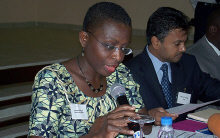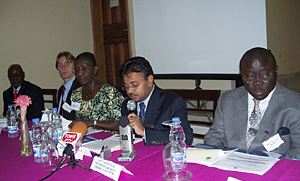The IMF and Civil Society

Minister Sayeh speaking at the seminar for Legislators in Monrovia, Liberia. Also shown is Fund Res. Rep. Michael Tharkur. (IMF Staff photo)
IMF-Liberia Dialogue Expands
May 23, 2008
An April seminar in Monrovia brought together teams from the IMF's African (AFR) and External Relations (EXR) Departments with Liberian legislators and representatives of civil society organizations (CSOs) to exchange views on the IMF's role in Liberia and to discuss the policy challenges facing the country.
As part of the Fund's ongoing efforts to enhance dialogue with legislators and members of civil society in low-income countries, AFR and EXR organized the Liberia program, which attracted high-level government officials and other leaders. Among the attendees: Finance Minister Antoinette Sayeh, Central Bank Governor J. Mills Jones, President of the Legislature Senator Isaac Nyenabo, and Speaker of the House of Representatives Alex Tyler.
In addition to the issue of IMF relations with Liberia and steps needed to achieve comprehensive debt relief, the group discussed the broader issue of the Fund's role and function in low-income countries. Fund staff provided an overview of Liberia's poverty reduction strategy, and a discussion followed on the role of the legislature in implementing this strategy. The program also covered Africa's regional economic outlook, as well as the impact of recent food and fuel price increases.
Officials Praise Fund Efforts

From right to left: Rep. Alex Tyler, Speaker of the House of Liberia legislature; Michael Tharkur, Mrs. Antonieta Sayeh, Minister of Finance, David Hawley, and Sen. Isaac Nyenabo, President of the Legislature
In her opening remarks, Minister Sayeh acknowledged the Fund's role in helping Liberia on the path toward comprehensive debt relief and the work of the Fund team. She said that her country would continue to pursue sound macroeconomic policies, and urged lawmakers to approve needed legislation to advance the country's poverty reduction strategy. For example, the Poverty Reduction and Growth Facility (PRGF) and the Heavily Indebted Poor Countries (HIPC) Initiative triggers involve implementing a new comprehensive Public Financial Management law for at least a year, and ensuring that the Liberia Anti-Corruption Commission is operating for at least a year. The year-long countdown cannot begin until legislators take action.
Other officials endorsed the Fund's outreach. Senator Nyenabo said that the effort indicated the Fund's awareness of the importance of the legislative role in Liberia's development process. The Fund is a "good and faithful partner" to Liberia, he noted. He said the activities of the Fund in the country had brought "reward" and relief to the country.
Details of Arrears Clearance Discussed
Seminar participants asked for details of the recent arrears clearance operation as well as the conditions associated with the PRGF arrangement and the HIPC Initiative decision point, approved by the IMF Executive Board in mid-March 2008. The group also asked the team to discuss ways the Fund could help bring real resources to stimulate growth, rebuild infrastructure, and address poverty in Liberia.
Team members noted the Fund's role in providing technical assistance drawing on best practices from around the world, but tailored to the specific circumstances in Liberia.
Mission Chief Robert Powell pointed out that country representatives had played a strong role in developing the Liberia Poverty Reduction Strategy (PRS), noting the strong country ownership of the policies and measures included as part of the strategy. Rather than a prescriptive consensus document from a team based in Washington, he suggested that the reduction strategy program was better described as the "Monrovia Consensus." For Liberia's program to be successful, the executive branch, the legislature, donors and civil society all must move in the same direction, Powell said. "The Executive cannot implement the Poverty Reduction Strategy on its own." He emphasized the importance of alignment and collaboration. "Donors will need to align their plans with the PRS, and the legislature will need to consider the bills that would allow the necessary structural reforms to take hold."
IMF Resident Representative Michael Tharkur outlined the extensive legislative agenda associated with the PRS, highlighting the critical need for new laws to help strengthen public financial management, the investment code, and the anti-corruption legislation.
Positive Meeting with Civil Society Representatives
The IMF team also convened a special half-day outreach session with representatives of 25 local CSOs, including non-governmental organizations, think tanks, and trade unions following the session with government officials. In a series of positive discussions on the same issues, the group welcomed the Fund's role in Liberia and emphasized the need for regular dialogue with legislators and CSOs.
Some participants said that the Fund had made considerable contributions to Liberia. Others noted that despite clearance of arrears, most Liberians continued to live in poverty. Still others wanted to know how they could become more involved in the process, as non-government leaders.
"We stressed their ongoing role in developing and revising the PRS," recalled EXR's Tilla McAntony, after the event.
During the session, the mission team also highlighted the Fund's role in helping create an environment which would attract both official and private resources to the country and ensure they are well managed. They emphasized the Fund's commitment to continuing the dialogue with their organizations during future visits.
